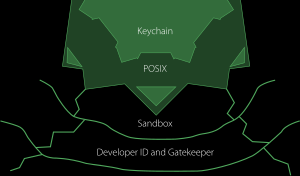System Integrity Protection

Security layers present in macOS.
|
|
| Developer(s) | Apple Inc. |
|---|---|
| Development status | Active |
| Operating system | macOS |
System Integrity Protection (SIP, sometimes referred to as rootless) is a security feature of Apple's macOS operating system introduced in OS X El Capitan. It comprises a number of mechanisms that are enforced by the kernel. A centerpiece is the protection of system-owned files and directories against modifications by processes without a specific "entitlement", even when executed by the root user or a user with root privileges (sudo).
Apple says that the root user can be a significant risk factor to the system's security, especially on systems with a single user account on which that user is also the administrator. System Integrity Protection is enabled by default, but can be disabled.
Apple says that System Integrity Protection is a necessary step to ensure a high level of security. In one of the WWDC developer sessions, Apple engineer Pierre-Olivier Martel described unrestricted root access as one of the remaining weaknesses of the system, saying that "[any] piece of malware is one password or vulnerability away from taking full control of the device". He stated that most installations of macOS have only one user account that necessarily carries administrative credentials with it, which means that most users can grant root access to any program that asks for it. Whenever a user on such a system is prompted and enters their account password – which Martel says is often weak or non-existent – the security of the entire system is potentially compromised. Restricting the power of root is not unprecedented on macOS. For instance, versions of macOS prior to Mac OS X Leopard enforce level 1 of securelevel, a security feature that originates in BSD and its derivatives upon which macOS is partially based.
...
Wikipedia
